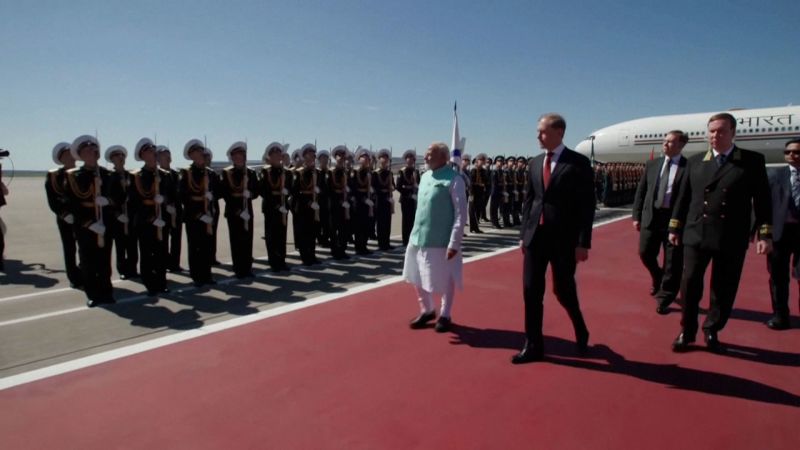India’s Prime Minister Narendra Modi arrived in Russia on Monday for his first visit to the country since Moscow began its full-scale invasion of Ukraine, a sign that the two nations remain close despite the Kremlin’s deepening dependence on China.
During his two-day visit, Modi is expected to attend a private dinner hosted by Vladimir Putin and hold talks with the Russian president, according to India’s foreign ministry spokesperson Randhir Jaiswal.
The summit will “provide an opportunity to the two leaders to review the whole range of bilateral issues,” Jaiswal told reporters in New Delhi last week, adding that Modi and Putin will “also share perspectives on regional and global developments of mutual interest.”
India remains heavily reliant on the Kremlin for its military equipment and has ramped up purchases of discounted Russian crude oil, giving Putin’s nation a major financial lifeline as it faces isolation from the West.
Trade between the two countries was worth nearly $65 billion in 2023-24, primarily due to strong energy cooperation, but most of that total flowed toward Russia, Jaiswal said.
Reducing the trade imbalance would be a “matter of priority” in Modi’s discussions with Putin, he added.
Modi last met with Putin on the sidelines of the 2022 SCO meeting in Uzbekistan, when he told the Russian leader: “Now is not the time for war.”
But while India has called for a cessation of hostilities in Ukraine and restoration of peace, it has also abstained from all resolutions on Ukraine at the United Nations and stopped short of condemning Russia’s invasion.
“I look forward to reviewing all aspects of bilateral cooperation with my friend President Vladimir Putin and sharing perspectives on various regional and global issues,” Modi said in a statement from his office before departing for Russia. “We seek to play a supportive role for a peaceful and stable region.”
Monday’s trip will be Modi’s first bilateral visit since winning a third consecutive term in a massive general election last month and is seen as a rare break in convention for an Indian leader who typically travels to neighboring countries such as Bhutan, Sri Lanka and Maldives.
The visit also comes as Russia draws ever closer to China, potentially making New Delhi uncomfortable due to its longstanding Himalayan border dispute with Beijing, which has simmered in recent years.
Modi’s trip follows Putin’s return from Kazakhstan, where the Russian leader last week attended the annual leaders’ meeting of the Shanghai Cooperation Organization (SCO), a bloc of Eurasian countries spearheaded by China and Russia, at which he claimed Moscow-Beijing relations were experiencing “the best period in their history.”
For India, that burgeoning relationship is “a matter of deep concern,” said Nandan Unnikrishnan, a fellow at the Observer Research Foundation in New Delhi.
“That is one of the reasons that Mr. Modi is undertaking this trip because traditionally, the Soviet Union and then subsequently Russia, has been a balancer in our relationship with China, which has been not the best since the late ’50s of the last century,” he said.
Despite India being an SCO member, Modi was visibly absent from the meeting in Kazakhstan, indicating to some analysts that the leader of the world’s largest democracy does not view the bloc as an effective channel through which New Delhi can pursue its interests.
Modi’s visit to Russia is also widely seen as the latest dent in efforts by Western leaders to cast Putin aside.
Despite undermining Western sanctions by purchasing large quantities of Russian oil, New Delhi has remained close with the United States, a key partner as both countries share concerns over China’s assertiveness in the Indo-Pacific region.
Modi met with US President Joe Biden during a state visit to Washington in June last year, in a trip further cementing their defense, trade and technology partnership. The Indian leader also addressed Congress during that trip, an honor typically reserved for close US allies and partners, and attended a lavish state dinner. India is a member of the Quad security grouping with the US, Japan and Australia.
Later that year, Putin did not attend the Group of 20 leaders’ summit in New Delhi, during which leaders delivered a consensus statement criticizing his invasion of Ukraine.
Following his Russia trip, Modi will visit Austria in the Indian leader’s first visit to the European nation, according to his office.



























